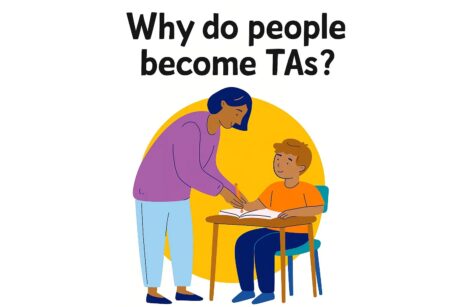Yes, you can! Many people ask, “Can I be a teaching assistant with a degree?” The answer is definitely yes. In fact, schools in the UK always welcome graduates who want to help children learn. Your degree can make a real difference because it helps you understand lessons better and support teachers more effectively.
So, in this guide, you’ll see how your degree can help you in the classroom. You’ll also learn what checks you still need, such as DBS and safeguarding. Then, we’ll look at quick ways to get school experience and how you can grow in this career.
Finally, we’ll talk about pay, how to move to higher jobs, and where to find great opportunities. If you enjoy working with children and want a meaningful role, becoming a teaching assistant could be your perfect next step.

Can I Be a Teaching Assistant with a Degree?
Yes, you can! You don’t need a degree to get a TA job, but having one can help you stand out. Schools often value graduates because they bring confidence, new ideas, and strong subject knowledge.
However, a degree alone isn’t enough. You must still show that you can work well with children and understand safeguarding. Even a little experience—like volunteering at a school or helping with tutoring—can make a big difference.
If you’re a graduate looking for a meaningful role, graduate TA jobs are a great way to start your career in education. You’ll learn how classrooms work, gain real experience and build strong skills that can lead to higher roles later.
If you enjoy helping children learn and want a job that feels rewarding daily, becoming a teaching assistant is the perfect choice.
Does Having a Degree Help You Get TA Jobs Faster?
Many people wonder if a degree helps get a TA job, and the answer is often yes. A degree can help you get interviews faster because it shows that you have strong skills and knowledge. But schools look for more than that. They want people who are kind, reliable, and good at talking with children. So, your degree is a good start, but experience matters too.
For example, you can volunteer in a school, help in after-school clubs, or do some tutoring. These things show that you enjoy working with children and understand classroom life. If you already have some graduate classroom experience, that’s even better. It helps schools see that you can support teachers and manage groups of children well.
So, while your degree gives you a head start, real experience helps you go further. When you show both, schools will see that you’re ready to make a real difference.
What Subjects or Degrees Are Most Useful for TA Roles?
Many people ask about the best degrees for teaching assistant jobs. The good news is that almost any degree can help you. What matters most is how you use your skills to help children learn.
Here are some useful degrees for TA jobs:
- English, maths, and science – These subjects are always needed in schools.
- Psychology – A psychology degree helps you understand how children think and behave.
- Education or child studies – These help you learn how schools and learning work.
- Languages – Good for helping pupils who speak another language.
- SEND-related subjects – Great for helping children with special needs.
- Sport, drama, or music – These subjects make learning fun and creative.
To keep it simple, any degree can help. You just need to show how your knowledge and skills can support pupils in class.
Can Graduates Start as a TA with No School Experience?

Yes, you can! Many people think they can’t, but that’s not true. You can start as a teaching assistant with no experience as a graduate if you take small, smart steps.
First, try to volunteer in schools in the UK. You can help with reading groups, classroom activities, or after-school clubs. Even a few hours a week can help you learn how a school works and show that you care about helping children.
Next, you can join a supply agency and take day-to-day roles. This helps you build quick experience and get good references from teachers. Also, talk to schools near you. Many are happy to let new graduates come in for short visits or classroom observations. These small chances can turn into real job offers later.
So, don’t worry if you don’t have school experience yet. With a little effort, you can build it fast and show schools that you’re ready to make a difference.
What Checks and Certificates Do Graduates Still Need (DBS, Safeguarding)?
Before you start working in a school, you’ll need a few important checks. These steps help keep children safe and make sure you’re ready for the job.
Here’s what you’ll need:
- Enhanced DBS for school staff – This includes a children’s barred-list check to show you’re safe to work with pupils.
- Right-to-work ID – You must show proof that you can work legally in the UK.
- Proof of address – Schools often ask for a recent bill or bank statement.
- Name change documents – If your name has changed, you’ll need to show proof.
- Two references – These can come from a university tutor, volunteering, or past work.
- Safeguarding training – This teaches you how to protect children and report any risks.
- KCSIE induction – Every school follows the Keeping Children Safe in Education (KCSIE) rules, so you’ll complete an induction to learn your duties.
These checks may seem like a lot, but they’re important. They show that you care about children’s safety and that schools can trust you as part of their team.
Do Graduates Earn More as Teaching Assistants?
This is a common question! Many people think having a degree means higher pay, but that’s not always true. In most cases, your teaching assistant salary in the UK depends on your role or grade, not just your degree.
Most schools follow the TA pay scale set by local councils or academy trusts. So, whether you have a degree or not, you’ll start on the same level as others in the same role.
However, your degree can still help you move up faster. For example, with experience, you can apply for higher-level jobs like Level 3 TA or HLTA (Higher Level Teaching Assistant). These roles pay more because they come with extra duties and more classroom responsibility.
So, while a degree won’t raise your pay right away, it can open doors to better-paid jobs later. In short, your hard work, experience, and willingness to learn make the real difference in how much you earn.
Can a Graduate TA Move into HLTA or Teacher Training?
Yes, you can! Many graduates start as teaching assistants and then move up. It’s a great way to build confidence and learn how schools really work.
There are two main routes you can take.
- First, you can go for a Level 3 qualification and then move on to an HLTA qualification. As a Higher Level Teaching Assistant, you’ll lead small groups, plan activities, and sometimes cover classes. This role comes with more pay and responsibility.
- Second, you can train to become a teacher. You can choose the PGCE route, a school-led course with QTS, or even a postgraduate teaching apprenticeship.
Your time as a TA will make your teacher training applications stronger. It shows that you already understand classroom life and know how to support pupils.
So, if you dream of leading your own class one day, start where you are. With experience and the right training, you can become a teacher from a TA and grow into a full teaching career.
How to Write a Graduate CV for Teaching Assistant Jobs
Writing a graduate TA CV is simple when you know what to include. You just need to show schools that you care about helping children learn. Keep your teaching assistant CV (UK) short—one page is enough.
Here’s an easy way to write it:
- Profile: Start with a short paragraph about why you want to work in a school. For example, “I enjoy helping children grow in confidence and learn new things.” This helps schools see your passion.
- Education: Then list your degree, university and key subjects that link to learning or child development.
- Experience: After that, add any work or volunteering with children. Include clubs, tutoring, or mentoring. Use short bullet points like:
- Helped a phonics group – 3 out of 6 pupils met their reading targets.
- Supported an after-school maths club for Year 4 pupils.
- Skills: Next, list your main skills, such as communication, patience, behaviour support, SEN awareness, and IT skills.
- Training: Add any training, like safeguarding or first aid, if you have it.
- References: Finally, include two referees, such as a tutor or past supervisor.
Overall, use short and clear sentences. Show schools that you are kind, reliable, and ready to make a difference.
Where Graduates Can Find Teaching Assistant Roles (UK)
Finding teaching assistant jobs in England is much easier when you know where to look. Many trusted places share new school jobs every week.
Here’s where you can start your search:
- GOV.UK Teaching Vacancies – This is the official government site for school jobs. It’s free, safe, and easy to use. You can also set alerts for new roles near you.
- Local Authority Websites – Many councils post school support vacancies before they appear anywhere else. Check your local council’s job board often.
- Academy Trust Sites – Visit the websites of big trusts in your area. They usually post their own job openings for teaching assistants.
- TES, eTeach, and Indeed – These are popular job websites. You’ll find both short-term and long-term TA roles there.
- School Recruitment Agencies – Sign up with trusted agencies that focus on education. Look for listings such as:
➡SEN TA jobs (for working with pupils who have special needs)
➡Learning Support Assistant roles
➡Classroom Assistant positions
Extra tip: Always read job descriptions carefully and tailor your CV to match each role.
With a little effort and patience, you’ll soon find a school that values your skills and gives you the chance to make a real difference.
Final Thoughts: Using Your Degree to Start a TA Career
Becoming a teaching assistant is a great choice. Your degree already gives you a strong start. But your care, kindness, and love for helping children matter even more. Take small steps. First, visit a school. Then, try volunteering or send your first CV. Each step will bring you closer to your goal.
Schools want people who are patient, friendly, and ready to learn. So, keep growing and stay positive. You will get there soon. To prepare faster, you can join the Teaching Assistant Course from Unified Course. It teaches you everything you need and gives you a trusted certificate. This course can help you stand out when you apply for jobs.
So, don’t wait. Take the first step today. Your journey as a teaching assistant starts now.
FAQ
1. Can you be a teaching assistant with a degree?
You don’t need a degree to become a teaching assistant. However, most schools ask for a Level 2 or Level 3 qualification in Supporting Teaching and Learning, or a similar childcare diploma.
2. Can you be a TA with no experience?
Yes, you can! Many schools welcome beginners. You can start by volunteering, helping in clubs, or applying for trainee or unqualified TA roles.
3. How much is a TA qualification?
A Level 2 Teaching Assistant course usually costs around £19 on discount, down from the full price of about £229.
4. Are there any free teaching assistant courses?
Yes, some sites like eLearning College offer free online teaching assistant courses with no time limits or deadlines.
5. What is the difference between a TA & HLTA?
A Higher Level Teaching Assistant, or HLTA, is a TA with extra training. They do more jobs, like leading lessons or covering classes.




